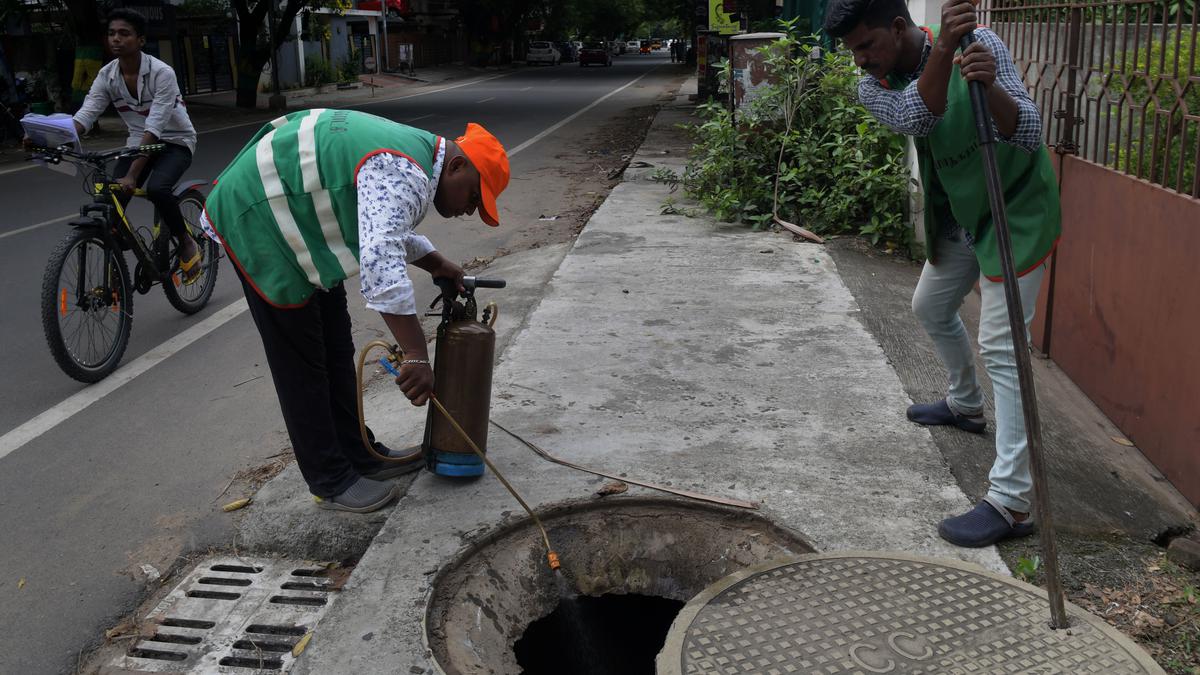
Greater Chennai Corporation launches mosquito control activities
The Hindu
Greater Chennai Corporation launches mosquito control activities
As residents have complained about an increase in mosquito density in the city after the rain, the Greater Chennai Corporation (GCC) has launched mosquito control activities, requesting residents to cooperate with malaria control workers to reduce mosquito density. The GCC will launch a drive to reduce breeding sources in vacant plots this week. Corporation workers will visit households in mosquito breeding hotspots to identify breeding sources.
Velachery resident S. Kumararaja said the mosquito density had started increasing owing to water stagnation after the rain. “Residents have highlighted sewage overflows in many areas. Water stagnation has increased. Mosquito breeding has increased after the summer season. The civic body should be prepared,” Mr. Kumararaja said.
Former City Health Officer P. Kuganantham said the vector borne diseases are likely to increase in seven days because of the rain. “The sector control approach adopted in 2011 was successful. A cluster of 500 houses were called a sector, and 3,500 workers were deployed after training. This measure reduced the larva and mosquito density when each area was measured by entomologists,” said Dr. Kuganantham.
The GCC has requested residents to call helpline 1913 to report mosquito breeding sources in vacant plots of land in their areas, particularly hotspots. Hotspots of mosquito breeding have been reported in areas such as Maduravoyal, R.K. Nagar, Kotturpuram, Perambur, Alandur, Nochikuppam, Ernavur and Semmencherry.
Geetha Ganesh, secretary of AGS Colony Residents’ Welfare Association, said most stormwater drains were filled with raw sewage because of which the mosquito menace is high. “Our ward 176 in Adyar Zone addresses issues concerning mosquito menace whenever we take it to authorities. Now that the south west monsoon has started and now and then it rains, mosquito menace is being reported. Every week NULM workers do fogging of storm water drains, street fogging is done regularly and wherever complaint is high, individual hand held fogging and spraying is done by GCC,” she said.
GCC Commissioner J. Radhakrishnan said a review of preparedness after the rain was conducted with all the staff of the Health Department, including zonal health officers, sanitary officers and sanitary inspectors. “The source reduction is intensified and closely monitored. Currently, 3,319 workers are on the field. Fogging is being done where mosquito density is reported, stormwater drains and slums. 240 fogging machines are currently being operated. Water stagnation points are identified and MLO spraying has been done. Vector density is being monitored by entomologists,” he said.
Pointing to complaints in the PGR systems, Mr. Radhakrishnan said complaints from PGR systems are closely monitored and addressed immediately. “People are being educated on mosquito breeding and its prevention by our workers. The vector control activities are closely monitored at all levels of the GCC,” he said.











